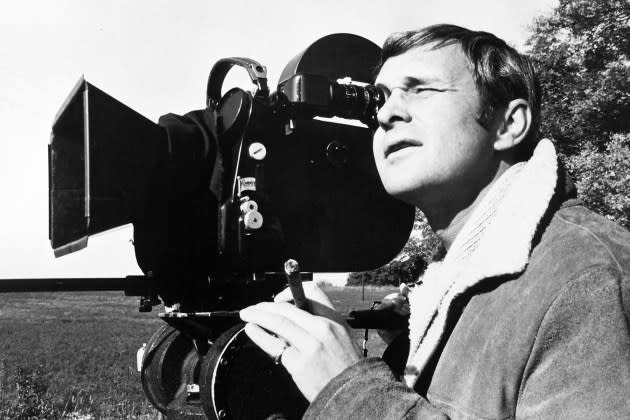Norman Jewison, ‘In the Heat of the Night’ and ‘Moonstruck’ Director, Dead at 97
- Oops!Something went wrong.Please try again later.
- Oops!Something went wrong.Please try again later.
- Oops!Something went wrong.Please try again later.
- Oops!Something went wrong.Please try again later.

Norman Jewison, the versatile, acclaimed filmmaker behind movies like Fiddler on the Roof and In the Heat of the Night, died Saturday at home, his publicist announced Monday. He was 97.
Jewison was a seven-time Oscar nominee and earned the Thalberg Memorial Award from the Academy of Motion Pictures Arts and Sciences in 1999. He earned both Best Director and Best Picture nods for the 1971 musical Fiddler on the Roof and the 1987 rom-com Moonstruck, starring Cher.
More from Rolling Stone
Marlena Shaw, Oft-Sampled 'California Soul' Singer, Dead at 81
Joyce Randolph, Last Surviving Cast Member of 'The Honeymooners,' Dead at 99
Peter Crombie, Actor Who Played 'Crazy' Joe Davola on 'Seinfeld,' Dead at 71
He also was nominated for an Academy Award for Best Picture for 1976’s In the Heat of the Night. The film, based on John Ball’s book of the same name, told the story of Virgil Tibbs, a Black detective involved in a murder investigation in Mississippi. In 2002, it was selected for preservation in the National Film Registry by the Library of Congress and was declared one of the 100 greatest movies in American cinema by the American Film Institute.
“The biggest grossing picture is not necessarily the best picture, so just tell stories that move us to laughter and tears and, perhaps, reveal a little truth about ourselves,” Jewison said in 1999 as he accepted the Thalberg Memorial Award.
In the Heat of the Night was one of numerous movies Jewison directed that focused on race relations, including 1984’s A Soldier’s Story and 1999’s The Hurricane starring Denzel Washington. (The Washington film followed the story of boxer Rubin “Hurricane” Carter, who was wrongly accused of a triple murder in New Jersey.)
“Every time a film deals with racism, many Americans feel uncomfortable,” he wrote in his autobiography This Terrible Business Has Been Good to Me, per the Associated Press. “Yet it has to be confronted. We have to deal with prejudice and injustice or we will never understand what is good and evil, right and wrong; we need to feel how ‘the other’ feels.”
Among his greatest work was Moonstruck, which earned Cher her Oscar for Best Actress, Olympia Dukakis the award for Best Supporting Actress, and John Patrick Stanley the prize for Best Original Screenplay. The 1987 favorite was a rom-com that followed a widowed Italian-American woman in love with her fiancé’s younger brother.
On Monday, the music icon took to social media to pay tribute to the director. “Farewell Sweet Prince,” she wrote on X (formerly Twitter). “Thank U For One Of The Greatest, Happiest, Most Fun Experiences Of My Life.”
Farewell Sweet Prince👑.
Thank U For One Of The
Greatest,Happiest,Most
Fun Experiences Of My Life.
Without U,I Would Not Have My Beautiful Golden Man.Norman U Made Moonstruck The GREAT FILM Ppl🩵.
Script,Actors,Etc,NEEDED U DEAR❤️
NORMAN JEWISON
LIVES ON THROUGH HIS WORK— Cher (@cher) January 22, 2024
In 1989, Jewison directed Bruce Willis and Emily Lloyd in In Country, which explored the painful legacy of the Vietnam War. He also directed movies such as Send Me No Flowers in 1964, The Cincinnati Kid in 1965, and Jesus Christ Superstar in 1973. In 1991, he released Other People’s Money, starring Danny DeVito and Penelope Ann Miller. Jewison’s last film came in 2003 with The Statement, starring Michael Caine, which was based on Brian Moore’s 1996 novel about Paul Touvier, a Nazi police officer who was indicted years after World War II. That film, which also starred Alan Bates, was his last theatrical role before his death in 2003.
Jewison was born in Toronto on July 21, 1927. He started working in entertainment as a child, performing at the Malvern Collegiate Institute, where he attended, before going to Victoria College at the University of Toronto, where he got his bachelor’s degree in General Arts in 1949.
He drove a taxi for a living after that before finding work at the Canadian Broadcasting Corporation (CBC). He also worked as a writer at the BBC during a two-year work-study program in London, before he came back to Canada for the CBC.
In 1958, he joined CBS, where he directed the music series Your Hit Parade, later the Andy Williams Show, and also The Broadway of Lerner and Loewe, which served as the TV debut of comedian Danny Kaye.
Jewison’s first major success came in 1966 with The Russians Are Coming, the Russians Are Coming starring Alan Arkin. The film, like many of his other works, shared a message of tolerance and earned him a Best Picture Oscar nomination. (Russians dropped the year before Heat of the Night.)
He released an autobiography called This Terrible Business Has Been Good to Me in 2004, and later received a Directors Guild’s Lifetime Achievement award in 2010.
From 2004 to 2010, he served as the Chancellor at his University of Toronto alma mater. Following his retirement from the post, Canadian philanthropist Blake Goldring donated $1,000,000 to Victoria University (formerly College) to start a first-year liberal arts program in Jewison’s name.
Best of Rolling Stone
